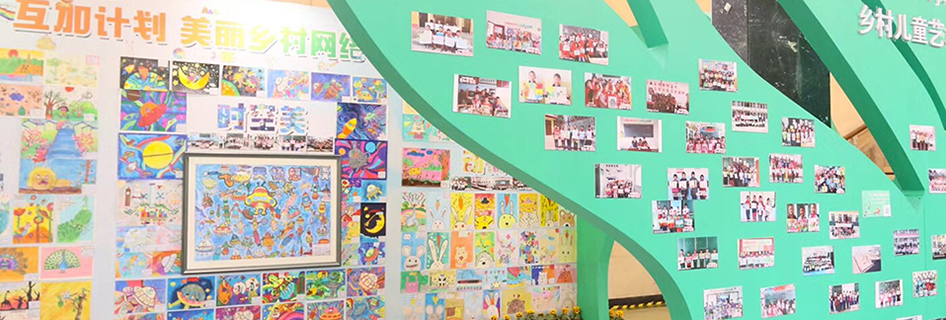On 18 April 2018, a special painting workshop given by Yang Songshou, a famous Chinese painter, went online and attracted thousands of rural students to learn at the same time via the Internet. In this featured event of Shanghai EduExpo 2018, Yang was invited by Hu+ Project, an educational charity program initiated by Hujiang EdTech in October 2015. This was one among many workshops that we organized. An increasing number of Chinese as well as overseas teachers are volunteering to participate in this initiative. Meanwhile, an exhibition displaying over 400 paintings and drawings by children from rural China was held on site, the first of its kind to take place. In fact, we received more than 2,000 submissions.
According to the “Report on Education Development in Rural China 2017,” the number of schools with fewer than 100 students was around 123,100, accounting for 44.59% of the primary schools and teaching units nationwide. Small rural schools totaled 108,3000 in number while the number of rural teaching units with fewer than 10 students hit 25,800.
It is this huge rural-urban gap in education in China that we are striving to bridge with all our efforts. Over the past two years, the Hu+ Project has reached over 3,000 rural schools nationwide, benefitting more than one million students so far. The scale of this outreach is truly remarkable. It is the Internet that makes this happen. This model turns out to be sustainable and replicable and the cost is relatively lower than other ways we have tried.
The Internet has led to a fairer education while technologies make learning easier and happier. With a cable, a computer and the Internet, online courses can be accessed from any corner of the world. Our team developed CCtalk, an interactive online education platform, as a core application to support the Hu+ Project. It allows users to learn anything that interests them. Such learning applications not only break down geographical barriers but offer more educational resources as well as a reduction in the cost of learning. Previously, many primary school pupils in rural China had only three major subjects, namely Mandarin, mathematics and English. Now, they can take the same courses as their peers in towns and cities, including physical education, drawing, music, science and art. Their drawings and handicrafts are displayed online or in exhibitions. When you meet these countryside children in person, you will be struck by their sincere smiles, gifted works, and, most importantly, the light in their eyes.
Online education is being used to address the problem of inequality in education between rural and urban areas and between different economic groups and regions, but developing technology or applications alone is far from enough. The core solution is in the equal distribution of education resources and teacher training. In fact, we have abundant learning resources and amazing teachers in China. However, the distribution of such resources is not yet well-balanced and most of the time not easily accessed by the most needy.
Educational charity programs like the Hu+ Project provide an answer to this. Rural teachers are given regular online training courses free of charge, enabling them to learn directly from top educators or instructors from all over the country in different subjects. It is encouraging to see that more teachers from rural China are taking part in it and gaining competence. They teach as they learn. Inspired by advanced online educational tools and handy teaching materials, rural teachers are more confident and feel a sense of achievement as they devote themselves to educating children in rural areas.
In 2017, Hu+ Project partnered with over 30 educational organizations such as the YouChange China Social Entrepreneur Foundation and Beijing Normal University to launch the Youth Teacher Empowerment Education Plan (“Youth TEEP”), which offers a wide range of supports to rural teachers. The plan provides courses in codes of ethics for educators and professional development, instruction in integration of online courses with curriculum teaching, along with a community learning platform. We hope such a program will help rural teachers to master modern education theories and teaching practices.
Technology means efficiency and flexibility in learning and teaching. The Internet allows people to study anytime and anywhere. Online courses are open to learners from entirely different academic backgrounds and of all ages. Learning opportunities for everyone are widening across the board and lifelong learning is becoming a reality. Furthermore, accessibility to a fairer education on a larger scale has been made possible by the Internet which facilitates the spread of knowledge and information, allowing people to learn and grow online. It promises both quality and equality in education.
In my view, education is a fundamental measure aimed at poverty relief while creating an opportunity to change one’s life through learning. It can lead to an academic degree, a promising career path and allow us to choose the ideal city where we want to live and work. I believe the more advanced technology develops, the more benefits people will get, regardless of their ages and backgrounds. Everybody has an equal right to education. It is no longer a dream but a tangible goal for all.



